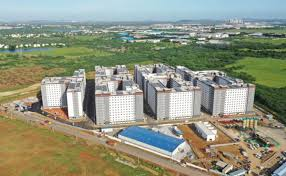
Table of Contents
Overview of the Project
1. Investment and Infrastructure
Foxconn’s investment of ₹700 crore represents a substantial commitment to the Tamil Nadu region. This funding will be allocated towards the development of a comprehensive housing complex tailored for the company’s workforce. The project includes modern residential facilities equipped with essential amenities, recreational areas, and other support services aimed at improving the quality of life for workers.
The housing unit will be situated near Foxconn’s manufacturing facility, reducing commute times and enhancing convenience for employees. This strategic location is expected to foster a better work-life balance, increase productivity, and contribute to the overall well-being of the workforce.
2. Capacity and Design
The housing complex is designed to accommodate approximately 18,000 women workers, reflecting Foxconn’s focus on creating a supportive environment for its predominantly female workforce. The design emphasizes comfort and safety, with features such as well-ventilated living spaces, secure premises, and access to healthcare and educational facilities.
The project includes various types of accommodations to cater to different needs, from single-room apartments to shared living spaces. Additionally, the complex will offer amenities such as dining facilities, fitness centers, and recreational areas to ensure a well-rounded living experience for the residents.
Implications for the Workforce
1. Empowering Women Workers
One of the most significant aspects of this initiative is its emphasis on empowering women workers. By providing dedicated housing, Foxconn is addressing several key challenges faced by female employees, including safety, mobility, and work-life balance.
Access to secure and comfortable housing is particularly crucial for women who migrate from different parts of the country for employment. By offering a stable living environment, Foxconn aims to create a more supportive and inclusive workplace, which can lead to increased job satisfaction and retention rates.
2. Enhancing Productivity and Efficiency
The proximity of the housing unit to the manufacturing facility is expected to have a positive impact on productivity. Reduced commute times can lead to fewer delays and increased punctuality, contributing to smoother operations and better overall performance. Additionally, the enhanced living conditions can lead to improved health and well-being, which in turn can boost work efficiency and reduce absenteeism.
3. Social and Economic Benefits
The establishment of the housing unit also brings broader social and economic benefits to the Tamil Nadu region. By investing in local infrastructure and creating job opportunities, Foxconn is contributing to the economic development of the area. The project is expected to generate employment not only within the company but also through ancillary services and businesses that will support the housing complex.
Furthermore, the focus on women’s empowerment aligns with broader social goals of gender equality and women’s participation in the workforce. The initiative can serve as a model for other companies and industries, demonstrating the positive impact of investing in employee well-being and inclusive practices.
Strategic and Operational Aspects
1. Collaboration with Local Authorities
Foxconn’s project involves collaboration with local government and regulatory bodies to ensure compliance with regulations and to facilitate the smooth implementation of the housing unit. This collaboration includes securing necessary approvals, adhering to construction standards, and addressing any logistical challenges.
The partnership with local authorities also reflects Foxconn’s commitment to contributing positively to the community and aligning with regional development goals. By working closely with local stakeholders, the company aims to integrate its project into the broader economic and social fabric of Tamil Nadu.
2. Environmental and Sustainability Considerations
The design and construction of the housing unit incorporate sustainability principles, aiming to minimize environmental impact. Features such as energy-efficient lighting, waste management systems, and green spaces are part of the project’s commitment to environmental responsibility.
Foxconn’s focus on sustainability not only aligns with global environmental standards but also enhances the quality of life for residents. Green spaces and recreational areas contribute to a healthier and more enjoyable living environment.
Broader Impact and Future Prospects
1. Setting Industry Standards
Foxconn’s investment in the Tamil Nadu housing unit sets a precedent for other multinational corporations operating in India. The project demonstrates the potential benefits of integrating employee welfare into corporate strategy and highlights the importance of creating supportive living environments for workers.
As more companies consider similar initiatives, the standards for employee housing and welfare could see significant improvements, leading to better conditions and increased satisfaction across various industries.
2. Long-Term Benefits
In the long term, the housing unit is expected to contribute to the sustainable growth of Foxconn’s operations in Tamil Nadu. By fostering a positive work environment and supporting employee well-being, the company can build a more dedicated and productive workforce.
Additionally, the positive impact on the local community and economy can enhance Foxconn’s reputation and strengthen its relationship with regional stakeholders. The project’s success could also encourage further investments and initiatives aimed at improving workforce conditions and contributing to local development.
3. Potential Challenges
Despite its many benefits, the project may face challenges related to construction timelines, cost management, and ongoing maintenance. Ensuring the quality and sustainability of the housing complex will require careful planning and execution. Addressing any issues promptly and effectively will be crucial for the long-term success of the initiative.
Conclusion
Foxconn’s ₹700 crore investment in Tamil Nadu, aimed at creating a housing unit for 18,000 women workers, represents a significant and forward-thinking initiative in the realm of corporate social responsibility. By prioritizing employee welfare and investing in modern, supportive living conditions, Foxconn is setting a high standard for workforce management and community engagement.
The project not only enhances the quality of life for female employees but also contributes to the economic and social development of Tamil Nadu. As the housing unit takes shape, it will serve as a model for integrating employee welfare into corporate strategy and demonstrate the positive impact of investing in sustainable and inclusive practices. The successful implementation and operation of this project will be closely watched, offering valuable lessons and inspiration for future endeavors in the industry.
Foxconn Foxconn Foxconn Foxconn Foxconn







